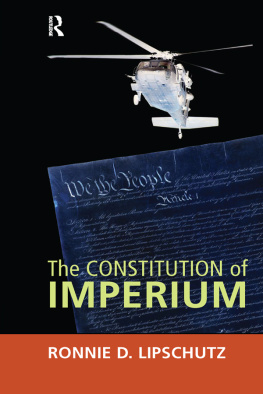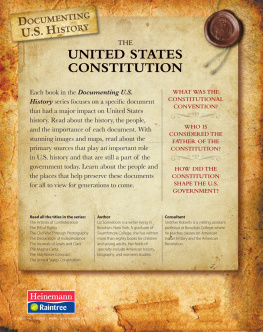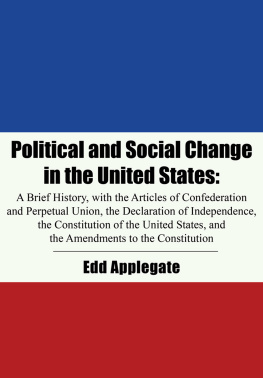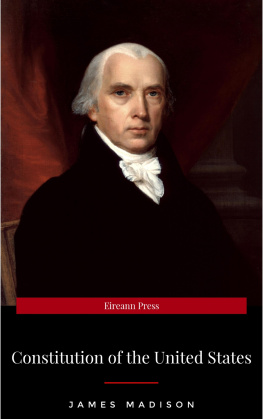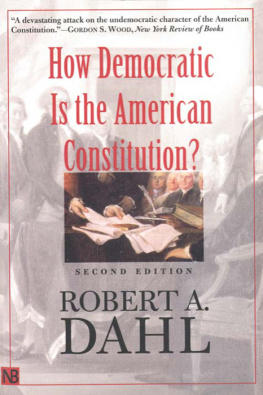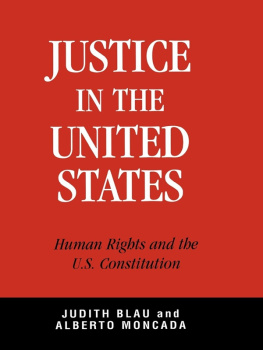THE CONSTITUTION OF IMPERIUM
RONNIE D. LIPSCHUTZ
THE CONSTITUTION
OF IMPERIUM
First published 2009 by Paradigm Publishers
Published 2016 by Routledge
2 Park Square, Milton Park, Abingdon, Oxon OX14 4RN
711 Third Avenue, New York, NY 10017, USA
Routledge is an imprint of the Taylor & Francis Group, an informa business
Copyright 2009, Taylor & Francis.
All rights reserved. No part of this book may be reprinted or reproduced or utilised in any form or by any electronic, mechanical, or other means, now known or hereafter invented, including photocopying and recording, or in any information storage or retrieval system, without permission in writing from the publishers.
Notice:
Product or corporate names may be trademarks or registered trademarks, and are used only for identification and explanation without intent to infringe.
Library of Congress Cataloging-in-Publication Data
Lipschutz, Ronnie D.
The constitution of imperium / Ronnie D. Lipschutz.
p. cm.
Includes bibliographical references and index.
ISBN 13: 978-1-59451-576-7 (hardcover : alk paper)
1. United StatesForeign relations2001. 2. International organization. 3. Globalization. 4. International economic relations. 5. World politics21st century. I. Title.
JZ1480.L57 2008
327.73dc22
Designed and typeset by Cheryl Hoffman.
ISBN 13: 978-1-59451-576-7 (hbk)
ISBN 13: 978-1-59451-577-4 (pbk)
Imperium: Command; absolute power; supreme or imperial power
Oxford English Dictionary On-line
The great struggles of the twentieth century between liberty and totalitarianism ended with a decisive victory for the forces of freedomand a single sustainable model for national success: freedom, democracy, and free enterprise. In the twenty-first century, only nations that share a commitment to protecting basic human rights and guaranteeing political and economic freedom will be able to unleash the potential of their people and assure their future prosperity. People everywhere want to be able to speak freely; choose who will govern them; worship as they please; educate their childrenmale and female; own property; and enjoy the benefits of their labor. These values of freedom are right and true for every person, in every societyand the duty of protecting these values against their enemies is the common calling of freedom-loving people across the globe and across the ages.
George W Bush, The National Security Strategy of the United States, September 2002
Championing freedom advances our interests because the survival of liberty at home increasingly depends on the success of liberty abroad. Governments that honor their citizens dignity and desire for freedom tend to uphold responsible conduct toward other nations, while governments that brutalize their people also threaten the peace and stability of other nations. Because democracies are the most responsible members of the international system, promoting democracy is the most effective long-term measure for strengthening international stability; reducing regional conflicts; countering terrorism and terror-supporting extremism; and extending peace and prosperity. To protect our Nation and honor our values, the United States seeks to extend freedom across the globe by leading an international effort to end tyranny and to promote effective democracy.
The National Security Strategy of the United States, March 2006, Sec. II.C.
CONTENTS
T his book began to take formas did many othersfollowing the events of September 11,2001. The text was not committed to paper (or, rather, computer) until the summer of 2006, and the version you are reading was last revisited in March 2008. With the end of George W. Bushs presidency in sight, this might seem a rather late date to publish a volume on empire. Yet there are excellent reasons to think that many of the legal and practical innovations of the Bush administrations various arms and agencies will not go away with a new president or Congress. Indeed, the structural problems that gave rise to 9/11 and similar incidents developed long before that fateful day and will remain to taunt and haunt the United States for a long time. Some may doubt this, or hope for better times; I do not.
Although all that is written here is my responsibility, I owe a great deal to colleagues, critics, and interlocutors. They include, in no particular order, Sandra Halperin, Mary Ann Ttreault, Kees van der Pijl, Ronen Palan, Phil Cerny Paul Lubeck, Shelley Hurt, and Ben Lozano, among many others. I owe special thanks to Alexander Reed-Krase, who doggedly read and questioned every chapter of the first draft, and to Jennifer Knerr, whose encouragement was instrumental to its completion. And, of course, I owe undying love and gratitude to Mary Wieland, who has stuck with me through thick, thin, and in between.
S ince September 11, 2001, the Bush administration and its counsels in the U.S. Department of Justice have been devising a Constitution of Imperium.
The paradox hereif, indeed, there is oneis that, in testing these limits, the Bush administration has sought to constitute an imperial authority that, by its own definition, would be nowhere subject to the long-assumed checks of either the U.S. Constitution, Congress, and the courts or international law. Instead, this authority operates outside the boundaries of American sovereignty, in defiance of the so-called international community and the United Nations, and in violation of the law of nations. Indeed, it is more accurate to say that the Constitution of Imperium is being written under the terms of normalizing what Carl Schmitt called the state of exception. This is a situation in whichlegal and constitutional statutes offering no clear direction or guidance to a state or its leaders when confronting a national emergencya self-constituted authority might be driven to act in an extraconstitutional fashion. Not even on September 11, 2001, was it wholly evident that such a condition existedbut then, states of exception are constructed by those who take it upon themselves to make such judgments. In Political Theology. Schmitt proffered the now well-worn phrase sovereign is he who decides the exception. Specifying the exception permits the decider to act above and abrogate such law as there might be and make legal whatever he or she might decide to do. Whether the events of that fateful day did constitute
We should not, however, imagine that, on September 12, 2001, Justice Department lawyers set out to craft a Constitution of Imperium, nor should we think that this project was launched at the express order of the White House or some other center of legal authority. To be sure, the presidents and vice presidents counselors began immediately to think about the legal and juridical bases for retaliation and revenge against those believed responsible for the 9/11 atrocities. As it became evident that those parties were associated with a nonstate network based in a country whose sovereignty and cohesion were being contested, the lawyers in the Department of Justice also began to argue that the international laws of war codified in the Geneva Conventions and other treaties did not provide sufficient legal cover for the military actions required to pursue and capture or kill those malefactors. Indeed, those laws acted as obstructions to sovereign action. Once President Bush declared a global war on terror (GWOT), it was deemed necessary to formulate a legal basis for actions and policies that might be required in prosecuting this and subsequent wars. Such seems to have been the general sentiment, given the possibility that any legal rationalization based wholly on the U.S. Constitution and the Geneva Conventions might be challenged in and overturned by American courts. Thus, the lawyers went to work crafting a constitutional framework that the courts and Congress could not touch.

